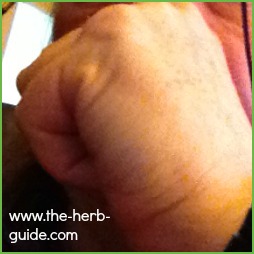- The Herb Guide Home
- Remedies
- Stop a Cough
Stop a Cough
As an Amazon Associate I earn from qualifying purchases

Stop a Cough
If you have a constant dry cough with no sore throat or other symptoms, then it could very well be a matter of habit and wrong breathing.
You may already have tried different
remedies as a cure for coughing and although you may get relief for a while, it still
comes back to be a nagging, persistent dry cough - the remedy doesn't stop it.

You can try a sample lesson to help you decide if the Herbal Academy of New England is the right choice for you - follow the link below.
It will often come in bouts and is probably worst first thing in the morning when you get up. I often notice it more though when I have a change of temperature - going indoors from out or vice versa.
Stop a cough - try this technique
I must admit, there have been times I have coughed so hard and long that I have pulled muscles in my rib cage.
Your dry cough could very well be the result of having too high levels of carbon dioxide in your system as a result of not breathing properly.
Try this technique to see if it relieves your cough.
As soon as you begin to cough, take three deep breaths through your nose and then exhale very deeply once through your nose.
So - inhale three times, until you feel that your lungs can't take any more, then exhale once though your nose.
The deep breaths will raise the oxygen levels in your blood and exhaling very deeply will remove carbon dioxide.
You can try it the next you start coughing and see if this dry cough remedy works for you.
Personally, I find that this remedy will stop my coughing immediately and it's something I can do any time.
The worst time for me, is when I feel that tickle coming on and I'm somewhere that I feel I can't cough without upsetting others. Theatre, church - crowded bus or train, especially during the covid-19 epidemic, where anybody who coughed was looked at sideways!
It does feel very strange to breathe in three times without breathing out, but your lungs have tremendous capacity and the first breath won't fill them, so take some more air and then some more until you really feel that you couldn't possibly take in any more air. Then breathe out until you feel that your lungs are totally empty (they won't be!).
This information is presented for general educational purposes only. You should consult a health care professional for the treatment of any medical condition.
What would you like to read next?
I may receive a commission if you purchase something mentioned in this post. See more details here This will not affect the amount you pay.




